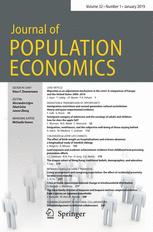The article finds that girls living in localities with return migrants in Mali are less likely to be circumcised. This effect is driven mainly by the returnees from Côte d’Ivoire, suggesting that, in addition to punitive action against those who practice Female Genital Mutilation (FGM) or information campaigns, having lived in an African country where FGM practice is not customary is equally influential. This is evidence for the relevance of social remittances through return migration here by improving social norms.
Read more in:
Idrissa Diabate & Sandrine Mesplé-Somps
Female genital mutilation and migration in Mali: do return migrants transfer social norms?
Journal of Population Economics, Vol. 32 (2019), Issue 4 (October), pp. 1125-1170.
Also GLO Discussion Paper No. 329.
GLO Fellow Sandrine Mesplé-Somps
Journal Website, complete issue 4.
Author Abstract: In this paper, we investigate the power of migration as a mechanism in the transmission of social norms, taking Mali and Female Genital Mutilation (FGM) as a case study. Mali has a strong FGM culture and a long-standing history of migration. We use an original household-level database coupled with census data to analyze the extent to which girls living in localities with high rates of return migrants are less prone to FGM. Malians migrate predominantly to other African countries where female circumcision is uncommon (e.g., Côte d’Ivoire) and to countries where FGM is totally banned (France and other developed countries) and where anti-FGM information campaigns frequently target African migrants. Taking a two-step instrumental variable approach to control for the endogeneity of migration and return decisions, we show that return migrants have a negative and significant influence on FGM practices. More precisely, we show that this result is primarily driven by the flow of returnees from Cote d’Ivoire. We also show that adults living in localities with return migrants are more informed about FGM and in favor of legislation. The impact of returnees may occur through several channels, including compositional effects, changes in return migrants’ attitudes toward FGM, and return migrants convincing stayers to change their FGM practices.
Read also the Lead Article of issue 4 (2019):
Gautam Hazarika, Chandan Kumar & Sudipta Sarangi:
“Ancestral ecological endowments and missing women“
Journal of Population Economics, Vol. 32 (2019), Issue 4 (October), pp. 1101-1123
Journal Website, complete issue 4. Paper PDF – OPEN ACCESS.
GLO Fellows Gautam Hazarika, Chandan Kumar Jha & Sudipta Sarangi

Ends;
